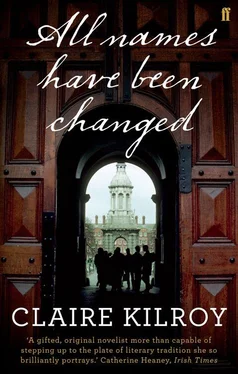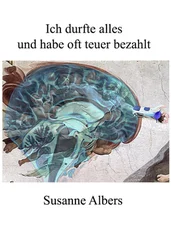Claire Kilroy - All Names Have Been Changed
Здесь есть возможность читать онлайн «Claire Kilroy - All Names Have Been Changed» весь текст электронной книги совершенно бесплатно (целиком полную версию без сокращений). В некоторых случаях можно слушать аудио, скачать через торрент в формате fb2 и присутствует краткое содержание. Год выпуска: 2010, Издательство: Faber & Faber, Жанр: Современная проза, на английском языке. Описание произведения, (предисловие) а так же отзывы посетителей доступны на портале библиотеки ЛибКат.
- Название:All Names Have Been Changed
- Автор:
- Издательство:Faber & Faber
- Жанр:
- Год:2010
- ISBN:нет данных
- Рейтинг книги:5 / 5. Голосов: 1
-
Избранное:Добавить в избранное
- Отзывы:
-
Ваша оценка:
- 100
- 1
- 2
- 3
- 4
- 5
All Names Have Been Changed: краткое содержание, описание и аннотация
Предлагаем к чтению аннотацию, описание, краткое содержание или предисловие (зависит от того, что написал сам автор книги «All Names Have Been Changed»). Если вы не нашли необходимую информацию о книге — напишите в комментариях, мы постараемся отыскать её.
All Names Have Been Changed — читать онлайн бесплатно полную книгу (весь текст) целиком
Ниже представлен текст книги, разбитый по страницам. Система сохранения места последней прочитанной страницы, позволяет с удобством читать онлайн бесплатно книгу «All Names Have Been Changed», без необходимости каждый раз заново искать на чём Вы остановились. Поставьте закладку, и сможете в любой момент перейти на страницу, на которой закончили чтение.
Интервал:
Закладка:
The bus performed a sharp swerve. We had turned away from town. I hadn’t checked the destination before boarding. I sensed that we were passing a church — the pale grey mass filling the fogged-up window on the left formed, in my peripheral vision, a church. The intuition quickly developed into a conviction. A church, definitely, no doubt about it. I kept my head down so as not to invite further disorientation. If it were, say, a school, for instance, and not a church — I wasn’t sure how I’d respond to that. Things were tentative that morning.
The woman in the front seat blessed herself. It was a church. The water in my shoes had warmed up. These are the things I noticed. My teeth felt sharp in my mouth. I had never been so acutely aware of them before. Had never been aware of them at all, really, but suddenly it seemed all wrong, this army of sharp objects regimented across my soft pink gums. Tail lights the size of cartwheels flared in the front window as the lorry ahead applied the brakes. The bus pulled in to allow a squad car to speed past, followed by an ambulance. Passengers craned their necks to get a look at the blur of flashing blue lights. Murmurs rippled through the top deck. We were no better than worried cattle.
The flashing blue lights disappeared when we took another corner. The chain of approaching headlamps on the far side of the street was replaced by a low lichen-green expanse. I stared at it for some time, trying to make it out, before realising that it was the Liffey. We were travelling along the quays. I jumped off at the next stop. The water in my shoes became cold again.
I stumbled up Westmoreland Street against the driving rain, colliding with pedestrians, apologising without looking up from my feet. I was almost hit by a car while crossing Fleet Street — I’d run straight into its path. Sorry, I mouthed at the driver, bloated and deformed behind whirring windscreen wiper blades. If I could just make it to Front Arch and get out of the thunderstorm. That’s what I kept telling myself as I blundered along. If I can just get under the Arch and take shelter for a while. The weather will be more clement on the other side.
It was no such thing.
The lights in House Eight were out, but the door was unlocked. Up the wooden stairs I ran and threw open the door to the workshop. It hadn’t been disturbed over Christmas. The murky shadows of raindrops trickled down the white walls like — I don’t know. Like something inimical. The creative imagination failed me that day. I couldn’t come up with a single simile to elevate those oozing shadows. They were nothing better than their grimy selves.
Glynn would not have fallen at that hurdle. He wrote about Irish rain as if no other rain in the world was quite like it, quite as desolate, quite as disabling. How bleak that room was without him, and without the group. I touched a radiator. It was cold. ‘Jesus, Mary and Joseph,’ I whispered — the touch of cold metal was the final straw. I stood there shivering and dripping, not knowing where to turn, a man who had reached the dock only to find that his ship had already set sail, after the great struggle to get there, the blind rush across the city.
‘Who’s there?’
The voice, a woman’s, had come from downstairs. I went out to the landing and leaned over the banister. Faye was standing at the foot of the stairs. She put her hand on her heart when she saw me.
‘Declan! Oh, thank God, you scared us. Come down — we’re all in the kitchen.’
The kitchen? There was a kitchen? I joined Faye at ground level and followed her around a corner, down another flight of stairs into the basement, whereupon she opened a door into a gaslight yellow room. And there they were, the girls the girls the girls, sitting around a table drinking tea. How did they know to be there? They just knew. They sensed the state of emergency too. We weren’t due in until Wednesday.
We sat around the kitchen table clutching mugs as intently as hands at a séance. I placed my copy of The Watchtower in the centre. There was one small window in the room, sealed shut with layers of old gloss paint. It faced onto the twelve-foot wall that separated Trinity from Pearse Street and was level with the cobbles outside. We looked out through weeds and security bars. A Superser heater wheezed away in the corner like a dozing grandparent. It was as if we’d always been there.
Guinevere was relating how she’d woken up that morning weeping for no good reason. Uncontrollably, she added. Difficulty breathing. Funny, how the mention of suffocation brings out the symptoms in the listener. We took deep breaths and nodded in sympathy. It was stuffier than the bus in that basement. Aisling’s chain-smoking didn’t help.
‘I don’t know why I’m so upset,’ Guinevere shrugged. She attempted a smile, but it didn’t take, which only made things worse. We were in the same seating arrangement as for the workshops, I noticed. It was no time for banal observations.
‘Poor pet,’ Faye murmured, in that calm, sympathetic way of hers which was soothing to us all. I wanted her to say it again. Guinevere was paler than usual that day. As white as a page, I remember thinking. But not as white as Aisling.
And then, when Guinevere finally got herself up and out of the house, a jumbo jet had flown overhead at too low an altitude, while a motorbike simultaneously accelerated past without a muffler, making that awful sound — ‘You know the one like a lion’s roar?’ We nodded. ‘Except it seemed that the roar had come from within the biker’s helmet, as if some mythical half-man, half-beast was inside.’
‘Oh fuck,’ said Aisling. ‘Chimera.’
‘I know it sounds stupid,’ Guinevere continued, ‘but what with the jet engine reverberating in the sky, and that violent roar warping the street, I suddenly found I couldn’t take another step, so I pretended to root around in my bag in search of something, when, in reality, I was crouching against the wall.’
‘Crouching against the wall!’ she repeated incredulously, and had a go at a laugh, her voice pitching upward.
‘Poor pet,’ Faye repeated.
Aisling was peeling strands of her hair in two. ‘Do you think the rain’s going to stop?’
Faye squinted out the little window. ‘Not for a while yet.’
‘Anyone catch a forecast?’ These were my first words to the group that year. Hadn’t even said hello.
No one had caught a forecast.
Faye asked for one of Aisling’s cigarettes. I didn’t know she smoked. ‘Something weird happened to me too this morning,’ she said quietly. Faye wasn’t one for talking about herself. She was more what you’d call a listener.
‘It’s no big deal, just, my doorbell rang, but when I opened the door, not a sinner was there. The garden was empty, and the latch on the gate was in place. No one could ring the doorbell, then run away and latch that gate in the time it took for me to answer. It’s a fecky little device, the latch. You see, you have to—’ Faye demonstrated with her fingers how to get the latch in place. These mid-air gestures made no sense without the context of the latch itself. She may as well have been playing a zither. ‘Anyway,’ she concluded, seeing the futility of her explanation, ‘it can’t be done that quickly. And the garden walls are too high to jump. I can’t explain how it happened, but when I closed the door, I sensed a presence in the hall with me.’
‘Is it here now?’ Aisling asked.
Faye rotated the ashtray, first clockwise, then anti-clockwise, her head tilted in concentration as if it were the combination wheel to a safe, Pandora’s Box. ‘She,’ Faye softly corrected Aisling. ‘She’s a she, this presence, not an it.’ Aisling shuddered extravagantly.
Читать дальшеИнтервал:
Закладка:
Похожие книги на «All Names Have Been Changed»
Представляем Вашему вниманию похожие книги на «All Names Have Been Changed» списком для выбора. Мы отобрали схожую по названию и смыслу литературу в надежде предоставить читателям больше вариантов отыскать новые, интересные, ещё непрочитанные произведения.
Обсуждение, отзывы о книге «All Names Have Been Changed» и просто собственные мнения читателей. Оставьте ваши комментарии, напишите, что Вы думаете о произведении, его смысле или главных героях. Укажите что конкретно понравилось, а что нет, и почему Вы так считаете.












